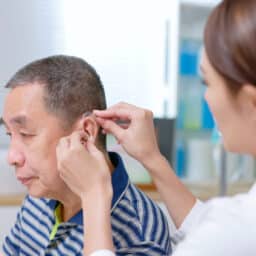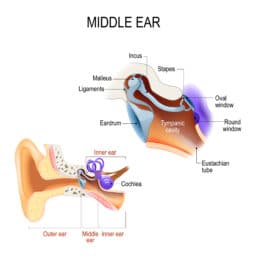Rainy Weather and Waterproof Hearing Aids

Approximately 28.8 million Americans need hearing aids, and when you’re choosing which style and features you want in your hearing aids, one option you’ll be presented with is waterproof hearing aids. During Huntsville’s rainy season, these waterproof options can be an incredible option. Moisture Hazards Like any other electronic device, hearing aids are susceptible to…
Can A Virus Cause Hearing Loss?

It’s cold, flu and COVID season again, which means there’s all manner of viruses in the air. Prevent getting sick by staying hydrated, washing your hands frequently, getting plenty of rest and getting vaccinated—it’s for your hearing health. How Do Viruses Cause Hearing Loss? While the connection between viral infections and hearing loss is still…
What to Know About Muffled Hearing in One Ear

Muffled hearing, or the sensation of hearing through a wall or underwater, can be unsettling, especially when it affects only one ear. Often, muffled hearing in one ear is temporary and not cause for concern, but it can sometimes point to a more serious issue. It’s helpful to know the potential causes for muffled hearing…
What Are the Causes of Conductive Hearing Loss?

There are three types of hearing loss: conductive, caused by a physical blockage that prevents soundwaves from traveling through the ear; sensorineural, caused by damage to the sensory cells within the inner ear; and mixed, which is a combination of the two. Let’s focus on conductive hearing loss and the different factors that can cause…
How Can Hearing Aids Help You Have the Best Summer Yet?

Summer offers long, sunny days perfect for picnics, outdoor concerts, barbecues and nature-filled hikes. If you’re among the 15% of U.S. adults with hearing loss, you might wonder how your condition will affect your summer fun. Let’s take a look at how hearing aids can help you enjoy the best summer yet. Engage in Social…
Recent Research Reveals Link Between Zinc and Noise-Related Hearing Loss

Researchers have recently made a breakthrough in the effort to understand the cause of noise-induced hearing loss. Nearly 15% of American adults experience some form of hearing loss, most of which is caused by prolonged exposure to loud noises. This discovery could be a key to learning how to protect hearing in other ways. The…
Can Allergies Impact Tinnitus?

Tinnitus is ringing, buzzing or other sounds in one or both ears when no sound is actually present. It is typically associated with age-related hearing loss or exposure to loud noises, and roughly 10% of Americans have experienced it in the last year. If you also have allergies, you may notice your allergies and their…
Tips for Living with Severe Allergies

Allergic reactions are an immune system overreaction to an allergen that would normally be harmless. Life-threatening allergic reactions are called anaphylaxis and occur immediately upon exposure to the allergen. Most allergies are harmless and a little annoying, resulting in itchiness, runny nose or sneezing, and symptoms can be treated with over-the-counter medications from Probst Drugs….
What is an Acoustic Neuroma?

An acoustic neuroma is a rare, noncancerous tumor that develops on the vestibulocochlear nerve and can affect hearing and balance. It is possible to have an acoustic neuroma without experiencing any symptoms. However, others can experience disorienting and debilitating effects that require treatment. Quick Facts About Acoustic Neuromas Also referred to as vestibular schwannomas They…
Can You Make Your Ear Roar?

Most people will be confused by this question, but there are a few folks who will understand. While we generally have control over most of our muscles, there are a few that move on their own in response to certain stimuli. It turns out, a muscle that sits in the inner ear called the tensor…